

Year 4 Curriculum Overview
Autumn Term and Year Summary 2024







Year 4 Curriculum Overview
Autumn Term and Year Summary 2024




Hampton Court House Prep is about providing an educational experience centred around the child with bespoke approaches for every individual. Whether in classroom settings, extra-curricular activities or charity work, we teach the children to be well-rounded and caring and to contribute to all aspects of school life. Our day-to-day curriculum is one of the foundations of this approach. Lessons are designed to be interesting, engaging, supportive and challenging so that all children feel able to do their best. Teachers will always enable children to contribute fully to lessons, learn and demonstrate new knowledge, skills and ideas, and to shape their voice as part of a dynamic, but homely, community.
At Hampton Court House, our Years 1 – 6 curriculum is designed with the holistic development of each child in mind. We aim to cultivate a love for learning, curiosity, and confidence in our students. Central to our intent is the bilingual programme for Years 1 – 4, where approximately 50% of the curriculum is delivered in French. This unique approach not only enhances language skills but also broadens cultural understanding and cognitive flexibility. Our goal is to support every child’s intellectual, social, and emotional growth through a rich and balanced curriculum where mistakes are accepted, and questions welcomed.
Our curriculum is implemented with a focus on creating an inclusive, engaging, and supportive learning environment with a sense of fun. For Years 1 – 4, the bilingual programme integrates French into everyday learning, covering subjects such as humanities, science, sport and the arts in both English and French. This immersive approach helps students develop proficiency in both languages naturally and enjoyably, with in class support used to ensure all children are able to understand and access the curriculum. Lessons are structured to build on previous knowledge, ensuring a smooth progression. Within years 5 and 6 more specialist teachers are used to deliver the curriculum which allows for the development of skills necessary to start their secondary education in year 7. We employ a variety of teaching methods, including individual tasks, group work, and hands-on activities, to cater to different learning styles. Continuous assessment practices allow us to monitor each child's progress closely and provide personalised support as needed.
Impact
The impact of our carefully crafted curriculum is seen in the enthusiasm and active participation of our students. They develop strong foundation skills in literacy, numeracy, and science, along with the ability to think critically and solve problems. The bilingual programme enhances their language skills and cultural awareness, giving them a broader perspective and improved cognitive abilities. Our students also grow in confidence, independence, and social skills. Regular assessments demonstrate enhanced academic progress and personal development, ensuring that students are well-prepared for the next stage of their education with a lifelong love of learning and a unique bilingual advantage.
Key contacts
Susie Byers Head of Prep sby@hchnet.co.uk
Eldon Fayers Assistant Principal | Teaching & Learning efa@hchnet.co.uk
Nick Edwards Assistant Principal | Data & Assessment ned@hchnet.co.uk
Paul Pearce
Deputy Head | Operations & Academic pgp@hchnet.co.uk
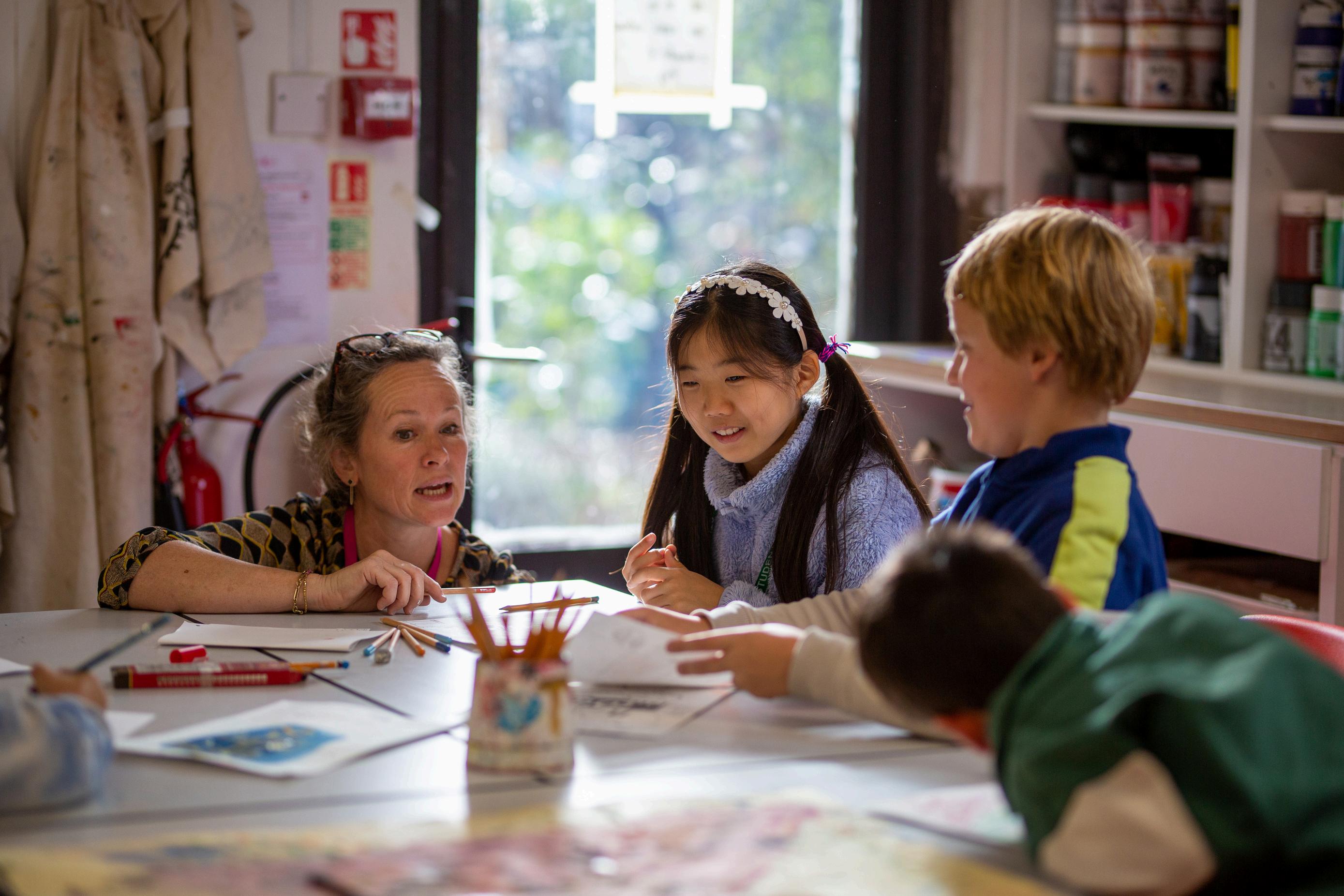

Year 4 Curriculum Overview Autumn Term 2024
Year 4 students will learn about the ceremonial masks that are traditionally made in Sub-Saharan Africa.
Pupils will make studies of the different types of shapes and decorative patterns of the masks and learn about the types of materials used Pupils will work from their studies and their imagination to design and make their own mask, using cardboard, papier mâché, and various materials for embellishment We will further explore this topic in learning about how African primitive art has influenced artists, in particular Pablo Picasso and Henri Matisse
Term
Autumn 1
Autumn 2
Spring 1
Spring 2
Summer 1
Summer 2
What are we studying?
African masks: Studies of different parts of Sub-Saharan Africa and the different types of masks, detective skills in looking for clues in shape, pattern, texture, material Symmetry, drawing, printing, developing skills in papier mâché construction
African masks continued: Pupils will develop portraiture skills though follow up studies to the mask project, looking at artists who have been inspired by African masks, the Primitive art movement, Picasso, Matisse
Greek Myths: Learning about some of the Greek Myths, pupils will make art in response to the story of Theseus and the Minotaur, the Trojan Horse, the Twelve Labours of Hercules
Romans: Pupils will learn about the importance of Roman pottery and use clay to make a traditional Roman game and a pot inspired by the Roman face pots discovered throughout the UK by archaeologists
Textiles: Weaving Pupils will learn about the Bauhaus designers Joseph and Anni Albers and learn about the symbolism of African Kente cloth Learning how a loom works and creating their own cloth on a box loom
Drawing / painting: Pupils will look at the work of Mary Fedden to inspire drawings and paintings which represent memories of special places

DDM is split into discrete subjects in order to cover a wide range of knowledge across humanities. In Year 4, science becomes a discrete subject which allows for DDM to deepen explorations in History and Georgraphy. Whilst it is an interlinked curriculum, we ensure that the essential foundation of knowledge needed for the later years of prep in each subject and senior are covered.
In Year 4 this term, we will explore the chronological order of significant historical events associated with Black History Month. We will learn about the creation of the world through Greek mythology such as Gaia, the Sphinx Ouranos and Oedipus.
We will discover geographical similarities and differences through the study of human and physical geography of a region of the United Kingdom, a region in a European country and a region within North and South America. We will locate the world’s countries, using maps to focus Central and South America, concentrating on their environmental regions, key physical and human characteristics, countries, and major cities.


Term
Autumn 1
Autumn 2
Spring 1
Spring 2
Summer 1
Summer 2
What are we studying?
We will discover the Ancient Greek civilisation and their myths. We will discover geographical similarities and differences through the study of human and physical geography of a region of the United Kingdom, a regional differences in Europe and North and South America. We will identify the position of and explore the significance of latitudes, longitudes, the equator, the northern hemisphere, and the southern hemisphere.
We will discover the Olympic games and their origins and the associated Olympian Gods. We will explore the world’s countries, using maps to focus on geographical areas of interest in Greece, Germany and Italy, as well as exploring their human geography.
Learn about Ancient Greece: artefacts, the way of life in Ancient Greece and the development of democracy? We will talk about the difference between Sparta and Athens. We will learn about the weather forecast and climates as well as natural disasters.
We will learn about the Roman Empire, their religious beliefs and the gods/goddesses they worshipped. Describing rivers, English and French rivers. Discovering what are the features of a river.
We will learn key facts about the invasion of Britain, why Romans built new roads in Britain and how/where, who Emperor Hadrian was and how he built the wall defending the northernmost point of the Roman Empire. Pupils will make presentations on the geographical knowledge they have learnt.
Using the graphic novels ‘Asterix and Obelix’ by Goscinny and Uderzo to talk about: Alesia, druids, menhirs, the Roman army, Roman Gaul (France) and Roman monuments. Pupils will compare feature between the Roman and civilisation of the Gauls.

Year 4 Curriculum Overview Autumn Term 2024
We begin Year 4 with a unit which explores Traditional Tales and Aesop’s Fables The children will read and enjoy a range of fables which have been retold by Micheal Rosen.
These well-known tales allow for great discussion and thought about the moral messages they depict as well as work on dialogue, character representation and use of extended sentences in the letters they write in role This unit also allows for much opportunity for drama and role play which the children really love Our next unit is based around non-fiction and Year 4 will learn more about how explanation and instructional texts are organised and presented The children will be using the Usborne Book of Art Ideas for a cross curricular approach to English Within the unit they will also be looking at the possessive apostrophe and the correct use of pronouns By the end of the topic the children will have invented their own art machine!
Just before half term Year 4 will look at animal poetry – especially ones about Cats and Dogs! The children will explore the use of similes, metaphors and personification as well as a variety of poetic devices such as rhythm, rhyme and tempo
After half term Year 4 start a topic based around Cressida Cowell’s much-loved text – How to train your Dragon This is a wonderful and funny book and the children will enjoy exploring the characters, funny events and setting and style of writing The use of adverbials to add sparkle to their own writing will be a key theme as they produce an extra chapter to the story
We then move on to a non-fiction unit on reports and report writing Year 4 will be looking at the book ‘Cool Architecture’ as a stimulus to their own report writing They will also be revising the use of conjunctions to create longer, more extended sentences. Our final topic of the Autumn Term looks at different poems from The Puffin Book of Utterly brilliant Poetry Year 4 will enjoy reading, discussing and performing a range of poems with a range of subject matters
How it will be assessed
Assessment will be through daily marking and feedback Through discussion and questioning At the end of each unit the children will be writing in the style of the author or poet they have been reading There will also be informal assessment of writing, reading and SPaG at the end of each term

Term
Autumn 1
Autumn 2
Spring 1
Spring 2
Summer 1
Summer 2
What are we studying?
Read a range of fables (Rosen's Aesop's Fables) explore dialogue through drama, debate moral messages and write letters using extended sentences. Finally children write fables. Get creative with The Usborne Complete Book of Art Ideas, exploring instructions & explanations. Study possessive apostrophes and pronouns. Invent and introduce an art machine. Cats and Dogs – explore narrative poems.
Read the hilarious How to Train Your Dragon, exploring plot, character, setting & style. Study pronouns, dialogue punctuation and adverbials. Write a new chapter.
Amazing architecture, world landmarks and influential architects inspire this block. Using Cool Architecture (Simon Armstrong) as a starting point, read and write stimulating reports. Revise extending sentences with conjunctions and use apostrophes for possession.
Read, discuss, learn and perform some fantastic poems from the Puffin Book of Utterly Brilliant Poetry.
Use versions of Princess and the Pea to explore, compare and write fairytales with a twisted point of view. Study dialogue, tense, pronouns. Role-play, write and perform playscripts.
Explore recounts through Little Mouse’s Big Book of Fears (Emily Gravett), After the Fall (Dan Santat),The Dark(Lemony Snicket). Study adverbials and possessive apostrophes. Poetry – List poems, kennings. Explore devices such as similes, alliteration and onomatopoeia.
Using rainforest stories, explore the issues confronting indigenous peoples and the environment. Create own stories and learn to correctly use the perfect form and paragraphs.
Read Wolves in the Walls (Gaiman) and Wolves (Gravett) for features of non-chronological reports. Use adverbs, prepositions and conjunctions of time/cause. Produce reports.
Explore narrative poems – You wait Till I’m older by Michael Rosen and other poems in The Works chosen by Paul Cookson.
The children will enjoy a collection of wonderful stories from Africa - Mufaro’s Beautiful Daughters, The Pot of Wisdom and African Tales. Write Ananse stories using extended sentences. Explore issues around animals in captivity, reading texts including Zoo by Anthony Browne and Rainbow Bear by Michael Morpurgo. Study adverbials and expanded noun phrases.
Using the lovely book ‘ I am the Seed that Grew the Tree’ Year 4 will enjoy reading and choosing poems, comparing and analysing, then writing. Study fronted adverbials and possessive apostrophes, all in the context of a poem for every day of the year.
Read The Butterfly Lion over the course of several days, using the opportunity to discuss, compare and analyse it. Perform role-play, write dialogue, use adverbials, and finally produce a new chapter for the book. Explore recounts using biographies from the civil rights movement: Henry’s Freedom Box and the story of Rosa Parks' life. Use dialogue punctuation, apostrophes and paragraphs.

Year 4 Curriculum Overview Autumn Term 2024
The children will be learning from a textbook called ‘Passe-Passe 3’ which breaks down the content into six different units This book offers a very active type of learning with many opportunities for children to learn through games, songs, movements and art. This multi-sensory approach allows children to communicate and grow as they are learning a new language.
The four skills (reading, writing, listening and speaking) will be alternatively assessed. There will be a test at the end of each unit for all the skills except speaking that is carried out as a formative assessment throughout the year. There will be vocabulary and French spelling tests weekly.
Term
Autumn 1
Autumn 2
Spring 1
Spring 2
Summer 1
Summer 2
What are we studying?
In the first autumn term, we will focus on Unit 1 of our exercise book, titled “Lilly chez ses cousins au Canada.” This unit emphasizes two key themes: family and animals. The children will learn related vocabulary and new grammatical concepts such as the verb “être” in the present. Additionally, since the unit is set in Canada, they will also explore Canadian culture, nature, and cities.
Unit 2, titled “Juliette et son équipe en Suisse,” focusses on sports, nationalities, and timings. The children will learn related vocabulary and new grammatical concepts, including the use of the verbs “pouvoir” and “avoir.” Set in Switzerland, this unit will also provide an opportunity for the children to explore and learn about Swiss culture and geography.
Unit 3, titled “Mehdi chez ses grands-parents au Maroc,” is focused on learning how to describe clothing, give instructions, and discuss habits. The children will expand their vocabulary related to these themes and learn new grammatical concepts, including verbs ending in “-er” and words describing intensity. Set in Morocco, this unit also provides an enriching opportunity for the children to explore and discover Moroccan culture.
Unit 4, titled “Pablo en classe découverte en Provence,” will teach the children how to describe a place, narrate an excursion, and buy food in a supermarket. They will expand their vocabulary related to these themes and learn new grammatical concepts, including the conjugation of the verb “partir” and words used to describe location. Set in Provence, this unit also offers the children the chance to explore and appreciate various cultural aspects of this region in France.
Theme 5, titled “Louis en week-end en Belgique,” focuses on stories and books, the circus, and ordering at a restaurant Students will learn all the associated vocabulary and new grammatical concepts, such as describing quantities. Set in Belgium, this unit also allows children to explore Belgian culture. Additionally, during this term, the children will prepare for their DELF exam, with one session each week dedicated to DELF practice.
Unit 6, titled “Manon journaliste avec ses copains en Dordogne,” focuses on describing past activities, explaining visits, and sharing personal experiences. The children will continue expanding their vocabulary and learning new grammar, such as conjugating verbs in the past tense. Set in the Dordogne region, this unit also offers an opportunity to explore the area's castles and rich history.

The first term of CE2 focuses on enhancing reading and writing comprehension through the study of documentary texts, equipping students with the skills necessary to understand and produce this type of text.
Punctuation is meticulously examined through the application of its rules Emphasis is placed on the correct spelling and usage of invariable words Conjugation lessons are designed to teach students how to accurately situate sentences in time Additionally, a practical recitation exercise is conducted using the text "Réunion de famille " Students will also be expected to write two book reviews during the term
Autumn 1
Spring 1
Compréhension et production écrites: le texte documentaire
Ponctuation
Orthographe : mots invariables
Conjugaison : situer une phrase dans le temps
Récitation : Réunion de famille
Autumn 2
Compréhension et production écrites : le récit
Production écrite : inventer une histoire en s’inspirant d’un texte
Identifier le verbe conjugué
Les pronoms sujets et groupes nominaux
Conjuguer ‘avoir’ et ‘être’ au présent
Récitation : La Grenouille aux souliers percés
Summer 1
Compréhension et production écrites: la recette de cuisine
Les terminaisons à l’imparfait, au présent et au futur
Les familles de mots
Récitation : Les Hiboux
Compréhension et production écrites: le poème
Le pluriel irrégulier de certains noms
La classe des mots (verbe, adjectif, nom, déterminant)
Comprendre des mots du lexique spécifique
Identifier la structure d’un texte
Spring 2
Summer 2
Compréhension et production écrites : la lettre et le texte théâtral
L’accord de l’adjectif
Les groupes nominaux
Récitation : Le Corbeau et le Renard
Compréhension écrite : Textes littéraires
Les synonymes
Les homophones
grammaticaux
Écrire une histoire structurée et cohérente
Récitation : Écrire à tout venant
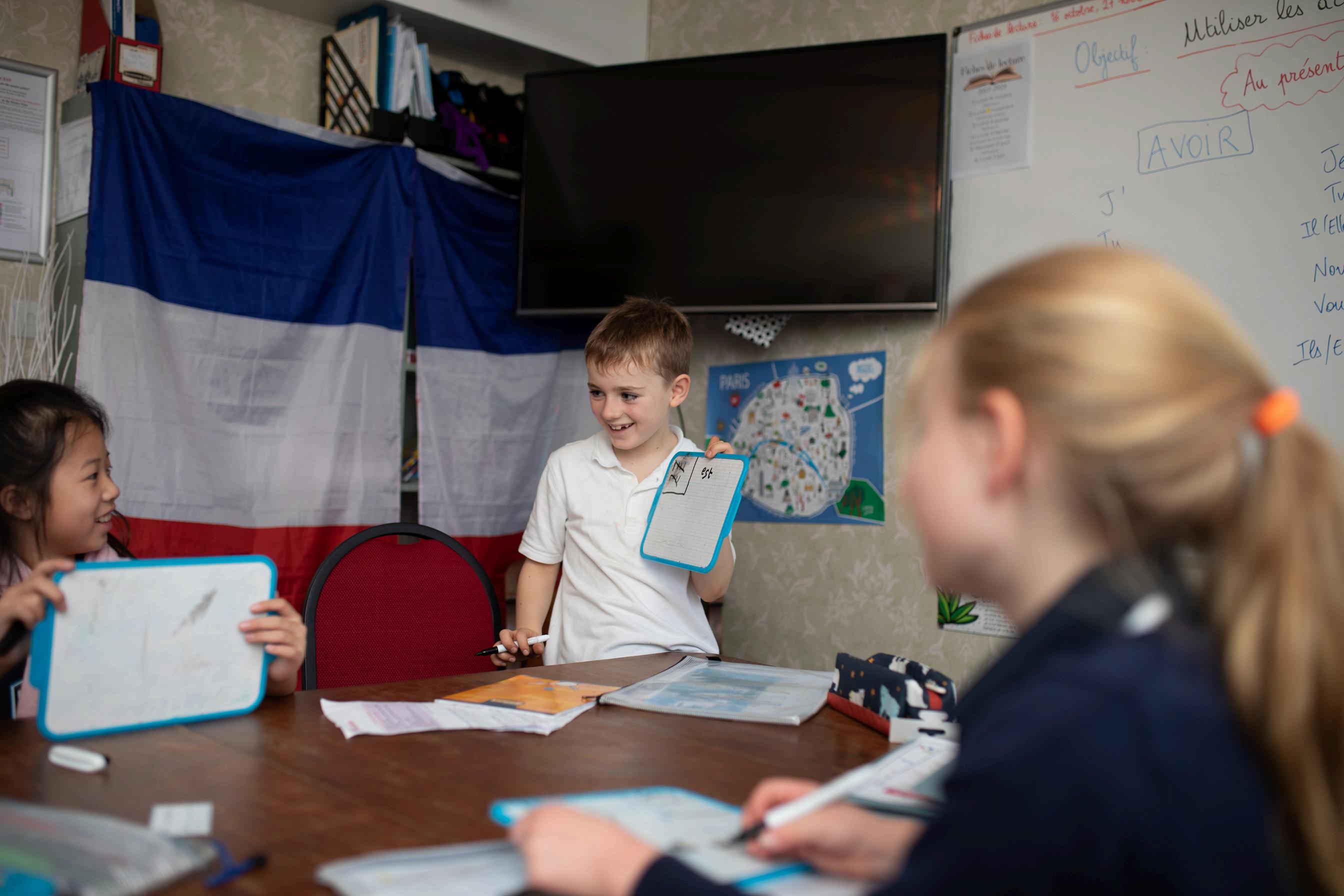

We are excited to introduce a new aspect of our French curriculum to complement our French immersion program with a Francophonie culture lesson. Learning about Francophonie at school has many benefits for students. It helps them understand and appreciate the cultures, traditions, and histories of French-speaking countries around the world.
This knowledge can make students more open-minded and aware of global diversity, which is important in today's world. It will help them appreciate the richness of the French language beyond France, recognising its influence in places like Canada, Belgium, and various African nations.
This lesson will take place one a week. It is tied deeply to other aspects of the curriculum, looking at French, History, Music for example. Children will discover different aspects of French culture, from literature, to theatre, to music, to cooking and more. We will talk about national events like, Remembrance Day, Pancake Day, Bastille Day, the Fête de la Musique, etc. We will also enjoy French music and dance, learning traditional dances or songs. We will also discover children's literature, movie’s character as Loup, Asterix & Obelix or Tintin & Milou.
This new lesson is there to enrich what we currently have and alongside them will be a number of event days to allow children to explore this all-new level of French civilisation in a very immersive way.


In the first half term the pupils will learn about:
Placing 3 and 4 digit numbers on a line
Place value in 4 digit numbers
Written addition and subtraction
Mental addition and subtraction
Telling the time, including the 24 hour clock
Calculating with units of time
Interpreting and drawing line graphs
How it will be assessed
Year 4 Curriculum Overview Autumn Term 2024
In the second half term the pupils will learn about:
Adding and subtracting powers of 10 with numbers greater than 1000
Using place value in calculations
Mentally add and subtract near multiples
Doubling and halving 2 and 3 digit numbers
Grid multiplication
Division using efficient “chunking”
Larger division with remainders
A written assessment covering the subjects that have been studied in that term. In addition, informal oral assessment takes place in lessons throughout the term to consolidate and assess depth of understanding.
Autumn 1
Spring 1
Place value of 3 and 4 digit numbers
Addition and subtraction
Telling the time
Drawing line graphs
Fractions – evaluating equivalent fractions
Factors and multiples
Drawing circles and polygons
Plotting co-ordinates
Consolidation of knowledge of 1 place decimals
Equivalent decimals and fractions
Multiply and divide decimals by powers of 10
Rounding numbers
Negative numbers in temperature
Roman numerals
Measure in m, cm, and mm
Use SI units
Summer 1
Construct bar charts
Consolidate knowledge of decimal and fraction equivalents
Factors and multiples
Applying formal methods to multiplication problems
Autumn 2
Spring 2
Calculating with powers of 10
Mental addition and subtraction
Doubling and halving
Grid multiplication
Division
Adding money using column addition
Addition and subtraction of decimals
Multiply multiples of 10, 100, and 1000
Division - “chunking” with remainders
Lines of symmetry
Types of angles
Properties of polygons
Summer 2
Areas and perimeters of rectilinear shapes
Applying formal methods to addition and subtraction problems
Further equivalent decimals and fractions


Organised physical activity is vital to child development, both in terms of strength and growth cognitive, motivational and social skills.
The Year 4 children will focus on the core skills of two invasion games, football and netball. In football, the children will develop their understanding of the core skills to play the game. This will include learning how to correctly pass, shoot and dribble in football. They learn about agility and transfer their understanding into small sided conditioned games.
In netball, they will learn to expand their knowledge of catching, throwing and movement. Students will be taught the basic positions, how to shoot and the different types of passes they can use in competitive game situations.
Term
Autumn
Spring
Summer
What are we studying?
Football: Passing, shooting, dribbling, conditioned games.
Netball: Passing, shooting, attack vs defence, positions & conditioned games
Games: balance, coordination, agility, stuck in the mud, octopus tag, capture the flag.
Gymnastics: balances, body shapes, travel, jumps and rolls
Hockey: Passing, shooting, dribbling, conditioned games.
Benchball: throwing, catching, positions and attack vs defence.
Cricket: throwing, catching, batting, bowling and fielding
Athletics: shuttle relay, 60m sprint, 200m sprint, hurdles, long jump, javelin throw and shot-put throw.
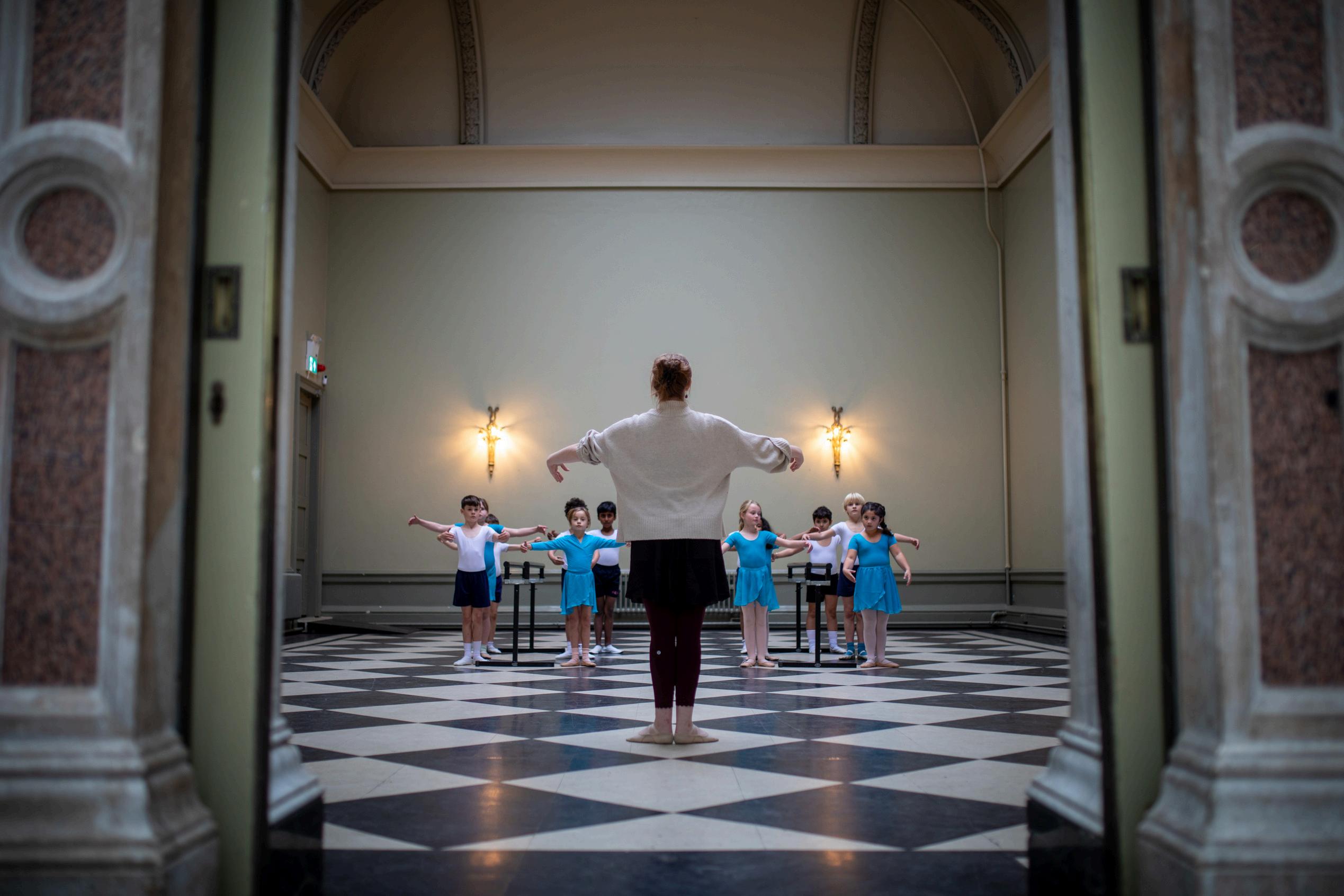

At Hampton Court House, we believe that the performing arts are integral to our school community. Therefore, our curriculum is built on students actively participating in various performances throughout the year. We are committed to offering inclusive opportunities that allow every student to showcase their talents.
In our lessons, to prepare for these performances students will focus on developing spatial awareness, musicality, vocal, physical, and character skills to enhance their performance abilities. They will learn stage craft and understand how to engage an audience.
Additionally, we place a strong emphasis on collaborative and creative skills, which are essential for every child's growth. Our classes incorporate engaging games and activities designed to foster teamwork, improve peer interaction, and develop the ability to follow directions. Students are encouraged to contribute creative suggestions through music, movement, and dialogue, ensuring a well-rounded arts education at Hampton Court House.
We begin the year by preparing for our Christmas show, themed around "The Nutcracker." Year 4 students will focus on developing their ballet skills, alongside incorporating singing into their performance.
In Year 4, Drama will be taught in French, enhancing language skills through theatrical expression. By the Easter term, students will have the opportunity to showcase their talents in a dedicated showcase event.
Throughout the year, there will also be numerous recitals and concerts, providing students with platforms to display their musical abilities and talents.
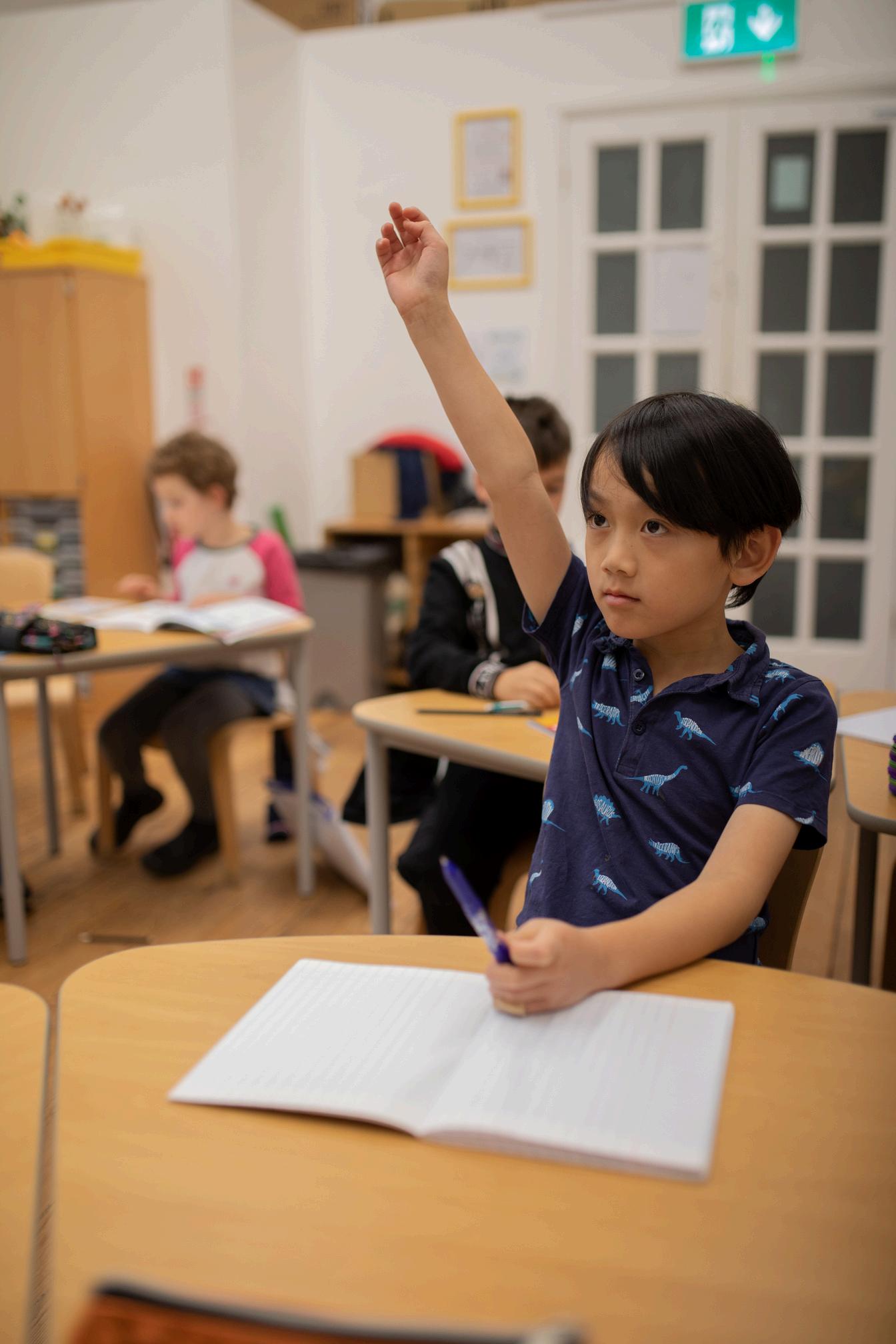

We begin PSHE across the Prep school by exploring the topic ‘Being Me in My World’.
We will begin by looking at the year ahead, considering any goals or fears the children may have. We will think about it means to be a global citizen, and from that, a positive member of the year group. In the second half term we will explore the topic ‘Celebrating Difference’. This centres around asking the question – am I normal? And understanding differences are what make us special. We also look at the importance of anti-bullying.
We aim to make all PSHE sessions as relevant to the students and their current needs and concerns, therefore our content is changeable, and suggestions and feedback are welcome at any time from students and parents.
How it will be assessed
PSHE lessons are predominantly discussion based, with some written tasks for deeper comprehension and application. At the end of each lesson, the students will complete self-reflection sheets for teachers to monitor understanding and adapt future teaching. Teachers keep track of the students’ levels and understanding of the different elements of PSHE across the year.
What are we studying?
Being Me in my World
Becoming a class ‘team’
Autumn 1
Being a school citizen
Rights, responsibilities and democracy
Rewards and consequences
Relationships
Jealousy
Love and loss
Spring 1
Summer 1
Memories
Getting on and falling out
Girlfriends and boyfriends
Healthy Me
My friends and me
Group dynamics
Smoking
Alcohol
Healthy friendships
Autumn 2
Spring 2
Summer 2
What are we studying?
Celebrating Difference
Judging by appearances Understanding influences Understanding bullying Problem solving
Special me
Changing Me
Unique me
Having a baby
Girls and puberty
Changes
Dreams and Goals
Hopes and dreams
Broken dreams
Overcoming disappointment
Creating new dreams
Achieving goals

Year 4 Curriculum Overview Autumn Term 2024
The Year 4 Science Curriculum will cover Electricity, States of Matter, Animals including Humans, Living Things and their Habitats, Sound and Classification of Living Things.
In this capacity the pupils will be taught the following skills: To plan different types of experiments; identify equipment required for experiment; take measurements, using scientific equipment; e.g. measuring cylinder and scales; record data and results in tables and bar and line graphs, using a ruler and a pencil; make predictions, using test results; and present findings, through graphs, tables evaluations and conclusions.
Pupils will be assessed on ½ termly tests to determine understanding and misconceptions. Then in the Summer Term the pupils will be assessed on the years’ work to evaluate knowledge and understanding.
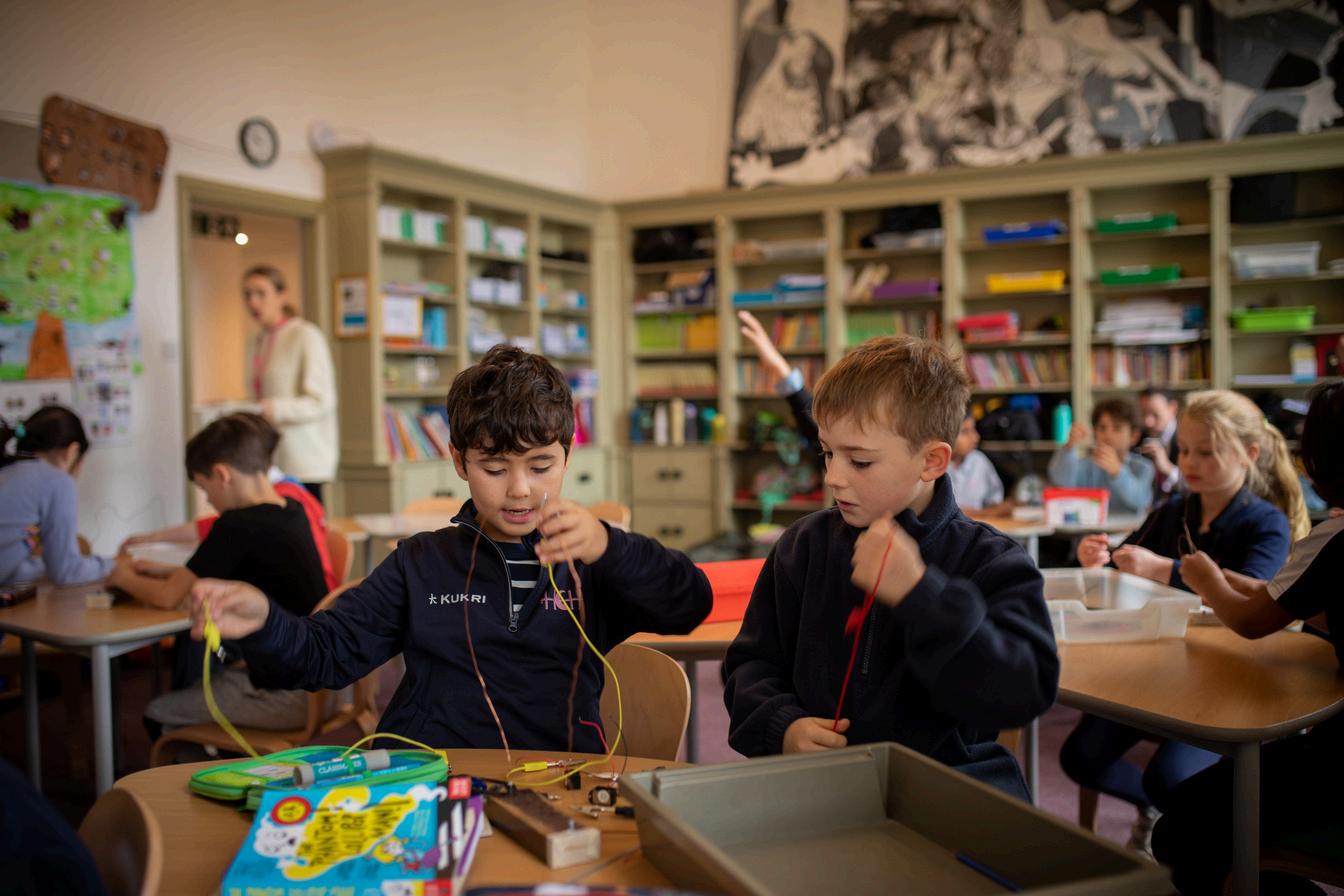

Term
Autumn 1
Autumn 2
Electricity
Spring 1
Spring 2
Summer 1
Summer 2
What are we studying?
Pupils will identify common appliances that run on electricity
They will construct a simple series electrical circuit, identifying and naming its basic parts, including cells, wires, bulbs, switches and buzzers
Identify whether a lamp will light in a simple series circuit, based on whether the lamp is part of a complete loop with a battery
Recognise that a switch opens and closes a circuit and associate this with a lamp light in a simple series circuit
Name some common conductors and insulators, and associate metals with being good conductors
Compare and group materials together, according to whether they are solids, liquids or gases
Observe that some materials change state when they are heated or cooled, and measure or research the temperature at which this happens in degrees Celsius (°C)
Identify the part played by evaporation and condensation in the water cycle and associate the rate of evaporation with temperature
Describe the simple functions of the basic parts of the digestive system in humans
Identify the different types of teeth in humans and their simple functions
Construct and interpret a variety of food chains, identifying producers, predators and prey
Recognise that living things can be grouped in a variety of ways
Explore and use classification keys to help group, identify and name a variety of living things in their local and wider environment
Identify how sounds are made, associating some of them with something vibrating
Recognise that vibrations from sounds travel through a medium to the ear
Explain different patterns between the pitch of a sound and features of the object that produced it
Find patterns between the volume of a sound and the strength of the vibrations that produced it
Recognise that sounds get fainter as the distance from the sound source increase
Recognise that living things can be grouped in a variety of ways
Explore and use classification keys to help group, identify and name a variety of living things in their local and wider environment
